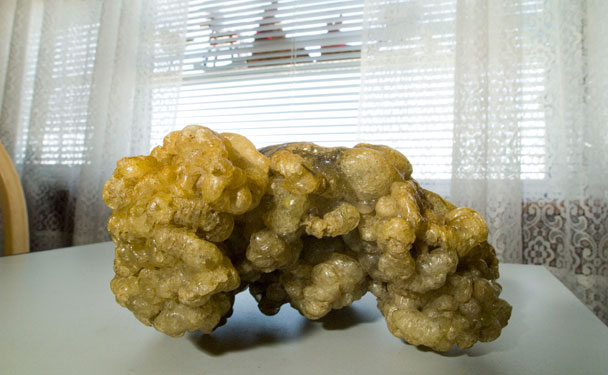The English King Charles II died following a sudden stroke on February 16, 1685. His unexpected death gave rise to rumors of foul play, and it was suggested that poison had been introduced into the king’s favorite breakfast of eggs with ambergris, the complex flavor of the ambergris disguising some sinister addition. The king probably liked his eggs scrambled, following the fashion of the times, but how did they taste with ambergris?
I had occasion to explore this question recently, when I received the unusual present of a lump of ambergris from a friend who runs a perfume supply business. Ambergris is an extremely valuable substance in perfumery, traditionally used as fixative to even out the various volatile essences so that the perfume has a consistent scent, rather than a succession of different ones. Today, artificial fixatives have become the norm, but the highest end of the French perfume industry still annually consumes a few kilos of ambergris (at an enormous price). But the peculiar origins of ambergris—a resinous material coughed up by certain kinds of sperm whales—are as fascinating as the scent itself. The resin congeals to a rocky, gray mass and is found washed up on the shore; back when sperm whales were hunted for oil, some were occasionally found to have ambergris in their digestive systems, and that extraordinary prize could bring a larger profit than anything else hauled in on the voyage. (Melville devotes an entire chapter of Moby Dick to the mysteries of the substance).
My little rock of ambergris is surprisingly lightweight, mottled grayish-black in color, and mineral-like—similar to pumice, but with an aroma that combines perfume, the sea and an overtone of animal scent. How could this hard, slightly sticky stuff be used in cooking? Brillat-Savarin has a recipe for a hot chocolate drink flavored with ambergris, and I imagined that the ambergris would just sink to the bottom and infuse the drink. But who wants eggs sprinkled with sandy, crunchy residue?
Ambergris isn’t actually a rock, however, and when crumbled it melts quickly. The heat of the eggs is sufficient to cause the small pieces to release their aroma, permeating the dish. I prefer fried to scrambled eggs, as the ambergris sizzles quickly on the surface and suffuses the whites thoroughly. The result is strangely marvelous because the eggs are delicately but mysteriously perfumed, a little like vanilla in an alternate universe. For some reason eggs prepared this way don’t really go well with bacon, but toast is just fine.




 Pinterest
Pinterest


